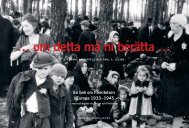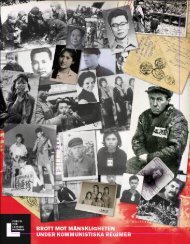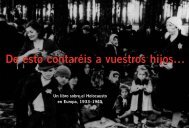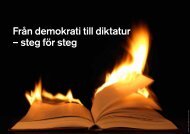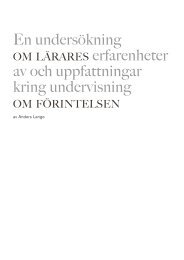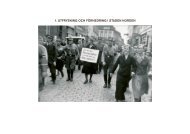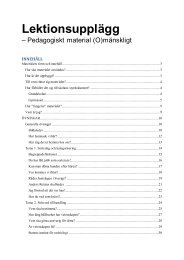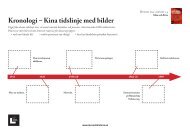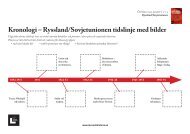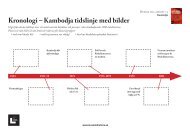Children…
Tell Ye Your Children... - Levandehistoria.se
Tell Ye Your Children... - Levandehistoria.se
- No tags were found...
Create successful ePaper yourself
Turn your PDF publications into a flip-book with our unique Google optimized e-Paper software.
“My friend led me to believe that<br />
Germany would be very pleased<br />
to see a volunteer’s movement in<br />
Sweden and that it would also benefit<br />
us greatly. Quite naturally, by the<br />
way. (…) Should we not find some<br />
way to actively display our interest<br />
in contributing to the obliteration of<br />
the Soviet Union? Surely we ought<br />
to make up for P.A. H(ansson)’s<br />
watered-down speech yesterday?<br />
Is there nothing we can do?”<br />
AN EXCERPT FROM A LETTER FROM COMMANDER ANDERS<br />
FORSHELL, SWEDISH NAVAL ATTACHE TO<br />
BERLIN, TO THE HEAD OF THE SWEDISH MILITARY INTEL<br />
LIGENCE, CARLOS ADLERCREUTZ, 30 JUNE 1941<br />
Sweden after “Operation Barbarossa”<br />
The war in Europe took a new turn after Germany<br />
invaded the Soviet Union on 22 June 1941. The Germans<br />
would fight a “war of annihilation”, urging all<br />
Europeans to join in their “crusade against Bolshevism”.<br />
In many countries, thousands responded to this<br />
call. The Swedish Government resisted abandoning its<br />
policy of neutrality, but reluctantly let the Wehrmacht’s<br />
Engelbrecht division transit from occupied Norway<br />
across Swedish territory to Finland. Some Swedes were<br />
unhappy with the Government’s reluctance, preferring<br />
more active participation on the German side.<br />
In December 1941, Japan’s attack at Pearl Harbor<br />
and Hitler’s declaration of war brought the US into<br />
the war alongside the Allies, essentially guaranteeing<br />
Germany’s eventual defeat. Despite the Soviet Union’s<br />
massive losses it stood victorious at war’s end; a fact<br />
lamented by some Swedes. Though public opinion had<br />
vacillated during the war, most Swedes supported the<br />
Allies throughout.<br />
First reports of mass murder<br />
News that Germany’s brutal policies had taken an even<br />
more murderous turn after June 1941 reached Swedish<br />
citizens and government officials through various channels.Although<br />
reports were sporadic, some newspapers<br />
published information about them frequently. In September<br />
1941, both Stockholms-Tidningen and Dagens<br />
Nyheter quoted the Italian newspaper La Stampa, when<br />
it wondered where Croatia’s Jews had disappeared to.<br />
According to La Stampa, an investigation into the matter<br />
had “not been able to reveal what fate has befallen<br />
these 50,000 Croatian Jews”.<br />
Swedish officials often received information on how<br />
Germany’s policies were becoming increasingly radical.<br />
In mid-October 1941, Sweden’s Military Attaché at the<br />
Legation in Berlin, C.A. Juhlin-Dannfelt, reported on<br />
mass death among Soviet prisoners-of-war, which he<br />
thought might prove to be “history’s greatest decimation”.<br />
Twelve days later, he reported that “in occupied<br />
parts” of the Soviet Union, Jews were being shot by SS<br />
special units, “including women and children”.<br />
But how, and when, do random pieces of information<br />
turn into knowledge and an understanding which leads<br />
to a change in attitudes and actions? Sweden received<br />
several pieces of the mass murder jigsaw, but an overall<br />
understanding was difficult to achieve. The will to<br />
actually believe the information and acknowledge this<br />
broader perspective was crucial to the individual’s ability<br />
to comprehend what was happening. For example,<br />
such a willingness existed in some Christian circles. In<br />
August 1943, Fl. Hällzon, editor of Hemmets Vän, wrote:<br />
“The mass graves of Jews cry out to the world; yes, they<br />
scream, and the screams pierce the skies up to God in<br />
Heaven. Woe betide Germany and those responsible<br />
when the bloody crops are harvested. Woe betide the<br />
world, which through its sins has participated in this<br />
blood-soaked crime being committed in our days.” By<br />
the end of 1942, many were already more or less aware<br />
of what was happening, which had a significant impact<br />
on Sweden’s official reaction to the genocide. Despite<br />
this, when the war ended, there were still those who<br />
denied that Germany had perpetrated such crimes.<br />
60



